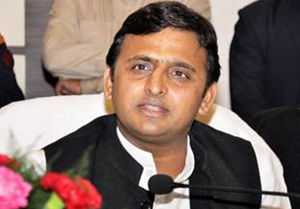Sant Kabir Nagar (UP), Nov 15: Taking a cue from the massive victory of the Grand Alliance against BJP in Bihar, Uttar Pradesh Chief Minister Akhilesh Yadav today said such a tie-up was possible in the state where Assembly elections are due in early 2017.
"A Grand Alliance is possible in the state," Yadav told reporters when asked about possibility of such a coalition materialising in UP to take on BJP in 2017 assembly polls. The Chief Minister, however, did not elaborate.
His remarks came a day after an Uttar Pradesh minister suggested a Grand Alliance involving ruling Samajwadi Party and Mayawati-led BSP for the upcoming assembly polls in the state similar to the one in Bihar where rivals RJD chief Lalu Prasad and JD(U) leader Nitish Kumar came together and decimated BJP.
Like Bihar, BJP had swept Uttar Pradesh also in Lok Sabha election last year and the party is hoping that it will return to power in the politically crucial state after nearly 15 years.
The Chief Minster, who was here on a private visit, said people in Bihar had given their decision in favour of development. In UP panchyat polls, they have favoured Samajwadi Party's development plank, Akhilesh Yadav said.
"We will contest the 2017 assembly polls on the plank of development as we have ensured progess in every nook and corner of the state," he said.
The grand secular alliance in Bihar comprising RJD, JD-U and Congress secured over two-third majority in the 243-member Bihar House, winning 178 seats in the just-concluded assembly polls in the state. RJD got 80 seats, JD-U 71 and Congress 27.
BJP-led NDA managed just 58 seats. BJP itself won 53 while its three allies LJP, Rashtriya Lok Samata Party and Hindustani Awam Morcha together secured only 5.
In Barananki, UP minister Fareed Mahfooz Kidwai had suggested that his party SP and BSP form a 'grand alliance' for 2017 Assembly polls to defeat BJP.
"God willing, a grand alliance will come into being here also (like in Bihar) and we will definitely defeat BJP and form our government," he had said.
To a question if SP and BSP, which are arch rivals in UP politics, can come together on the lines of Bihar, Kidwai had said, "It is my wish". The assembly poll victory in Bihar dealt a blow to BJP and Prime Minister Narendra Modi.
Samajwadi Party chief Mulayam Singh Yadav had played the role of a peacemaker between the two backward class heavyweights - RJD chief Lalu Prasad and his friend-turned-foe JD(U) leader Nitish Kumar-- and they decided to contest the 2015 Bihar polls together. However, Samajwadi Party had later pulled out of the Grand Alliance.





Comments
Add new comment